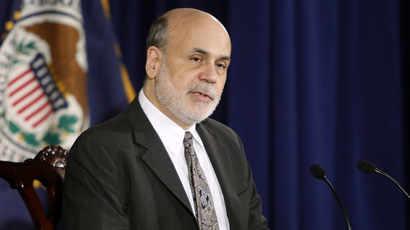Under attack: Germany says European Central Bank’s quantitative easing illegal

Germany is casting doubt on the European Central Bank’s strategy to end Europe’s ‘sterilized’ intervention. Instead of acting unilaterally, it will for the first time pass the decision to the European Court of Justice.
Germany’s constitutional court said the European Central Bank’s bond-buying program- Outright Monetary Transaction (OMT) - “infringes” on the powers of individual nations, a claim the ECB has flatly denied.
ECB takes note of announcement made today by German constitutional court. ECB reiterates that the OMT programme falls within its mandate
— ECB (@ecb) February 7, 2014
The OMT program was launched in response to the European debt crisis in September 2012 under ECB President Mario Draghi, and is credited with helping the flagging euro currency make a market comeback. Under the program the Governing Council of the ECB buys in secondary, sovereign bond markets the obligations issued by Eurozone members.
“In the view of the Senate, there are important reasons to assume that it exceeds the European Central Bank’s monetary policy mandate and thus infringes the powers of the member states, and that it violates the prohibition of monetary financing of the budget,” the court said on its website.
The main “infringement” is that sterilization, a conservative policy measure used to stabilize the euro during the crisis - once abolished, could pump nearly $237 billion (175 billion euro) into the economy, Reuters reports. This would bring calm to euro zone currency markets.
At yesterday’s ECB meeting, Draghi said he wasn’t against bond-buying, and that the ECB is allowed to buy government bonds in the secondary market and the move wouldn’t be in violation of any eurozone rule, citing the Maastricht Treaty.
The ECB president has said he would only end “sterilization” and start buying bonds with the support of Germany’s Bundesbank.
The European Court of Justice will settle the tiff, with many analysts of the opinion the court will side with the ECB and not Germany.
University of London European Law expert Gunnar Beck believes the European Court of Justice will support the OMT program.
"Practically speaking, the Court of Justice is not an independent organization but is pre-disposed to interpret legal questions in the interest of the European Union," he said.
Either way, it will be difficult for the ECB to activate the OMT bond-buying program, as it has to wait for a ruling from the ECJ, which some experts believe could be years out.













